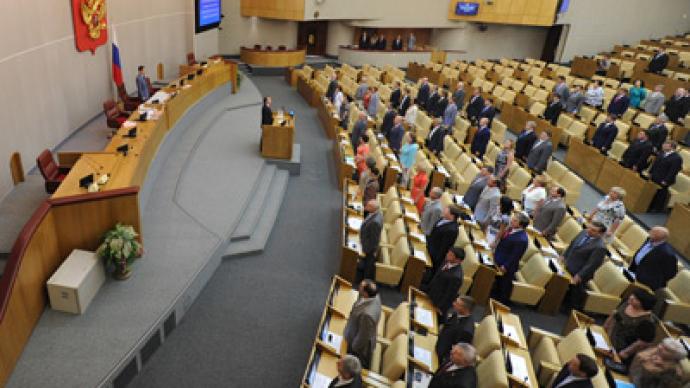Russia’s parliamentary majority creates commission to filter 'stupid bills'

MPs of the parliamentary majority faction United Russia have decided to set up a council that would sift out openly stupid and populist bills that have no chances of passing through the State Duma.
The council is much like the “zero hearings” – the preliminary discussions of especially important draft laws that were used previously in the Lower House, the RBC daily newspaper reported, quoting an unnamed high-ranking source in the United Russia party.The source also gave an example of the initiatives that should be filtered – the recent suggestion by one United Russia MP to include the mass media receiving money from abroad in the list of foreign agents. Even other deputies of the majority faction agreed that the move was pure populism and the amendment was turned down at the first hearing. But it was after this move that the party leaders suggested that all legislative initiatives first undergo official internal discussion. The head of the Russian Education Agency Nikolai Bulayev has been appointed the head of the council. The body is divided into five sections that will study various MP initiatives and either allow them to submit them to parliament or issue recommendations on changes. The council will also meet once a month to discuss its work.The MPs say the council will prevent the theft of legislative ideas inside the party.The new body held its first session on Wednesday and discussed various bills submitted by regional MPs. Many were rejected and some sent back for reworking, the council member claims. They added that the major reason for rejection was that the suggested bills duplicated existing ones. The initiative was welcomed by rival factions. Communist MP Vadim Solovyov has said that United Russia needed internal censorship as its members “have quite a wild understanding of legislation”. The politician added that his own Communist party avoids mistake by putting to discussion only the most important legislative drafts. The internal discussion will possibly prevent populist and weird drafts from entering the Federal Parliament, but it should be noted that Russian regional legislatures sometimes show even more initiative than their colleagues in the capital. For example, as the Legislative Assembly of Russia’s second-largest city of St Petersburg discussed the bill on preventing noise pollution, the deputies suggested an official ban not only on loud music and shouts, but also on moving furniture and refrigerators, on dog howling and cat stomping and finally – on loud sex.














